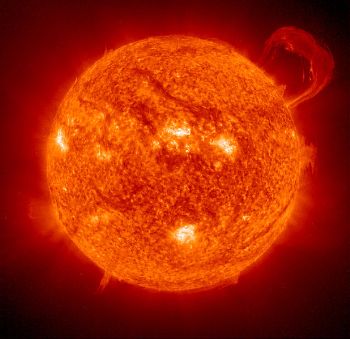by Larry
March, 2015The Inevitable Waning of Life on EarthYet it was not until reading a recent article by René Heller in "Scientific American," Better Than Earth, January, 2015, pages 32-39, that I realized the likely absoluteness of what it means to be finite. The piece points out that as living things we inhabitants of Earth are on the way out. Life began here roughly four billion years ago when our planet was relatively young. For the majority of the vast amount of time since then, organic molecules existed in pre-cellular or unicellular forms, so we might think of that multi-billion
Just as few in our pre-school days considered that we ourselves were going to expire, yet most of us have now accepted that fact, so as we living things on Terra are into our advanced years, we are coming to terms with changes that make our eclipse unavoidable. We have in recent years been learning of global warming, yet the ten degrees or so of increased temperature that human activity may now be effecting is but a tiny blip on the weather screen showing a massive climate change storm headed our way. Over a million fold more massive and many times more energetic than Earth, the Sun's progressive internal changes will raise its radiation to Earth about 1% each 100 million years. Long before it becomes a red giant, the Sun is predicted to have warmed our world to temperatures such as Venus has now, evaporating every river, lake, and ocean and killing off all life that depends on liquid surface water. Solar heat waves will reach farther and more intensely out into the planetary orbits of the Sun's several planetary satellites. There will be no air-conditioning system capable of dealing with the sure rise of our overall temperatures. The "Scientific American" author suggests we locate planets in other star systems that may be more habitable than Earth is likely to be in a few hundred million years. We might look to them for signs of life outside our solar system, perhaps even intelligent examples of alien biology. Some believe we shall find proof of life beyond Earth in as little as 200 years. I wonder, if so, how this will alter us. Could we also then send groups of colonists from this system to distant star worlds in hope of starting over there when Earth becomes completely uninhabitable? Perhaps, yet it is the stuff of science fiction, not science fact. It would, given any remotely realistic means of life sustenance and propulsion, require far too great resources of the home planet to deliver a viable colony to another star, much less one with a globe just waiting for us to show up and fashion it into our new home world. And it would take us far longer to get there than the entire period we have already been a civilized species. If we can somehow adapt ourselves to tens of thousands of years of weightless space travel and gut Earth sufficiently for the means to sustain and move ourselves on that epic journey, our chances of then readapting to a different planet with its foreign gravity, temperatures, and atmosphere seem so remote as to mirror the odds of light escaping a black hole. |
